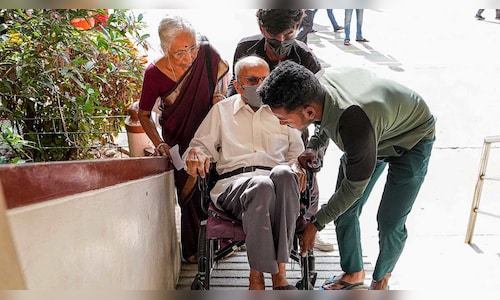The aviation regulator has proposed amendments to its Civil Aviation Requirements (CAR) to strengthen rules governing wheelchair assistance and special services for passengers with disabilities. The move comes in the wake of growing concerns and reports of misuse of wheelchair services at Indian airports.
Earlier this year, CNBC-TV18 had reported how some able-bodied passengers were booking wheelchair assistance which is a facility meant exclusively for persons with reduced mobility to bypass long queues and expedite security and boarding. Airlines, under pressure to deliver on these requests, often struggled to allocate adequate resources, leaving genuine passengers with disabilities inconvenienced. Some staff members at Mumbai airport had told CNBC-TV18 they get up to 120 wheelchair requests for a single international flight from Mumbai.
Also read | Air India Express makes PAN-PAN call as flight lands safely in Indore after mid-air engine glitch
What changes now?
The proposed DGCA amendments introduce stricter clarity and accountability:
- Misuse Prevention: The DGCA has now explicitly allowed airlines to levy an assistance fee for passengers who are not disabled but still opt for such services.
- Advance Notification: Passengers with disabilities must now notify their requirements 48 hours in advance so airlines can arrange necessary support.
- Booking Codes: Airlines are mandated to display internationally recognized assistance codes (WCHR for ramp, WCHS for stair, WCHC for cabin, BLND for blind, DEAF for deaf, etc.) at the time of booking.
- End-to-End Assistance: Once a passenger with reduced mobility reports at the designated drop-off point, the airline is responsible for seamless, free-of-charge assistance from the terminal to the aircraft, and vice versa at the destination.
Wheelchair Use:
- Passengers may use their own wheelchairs if they comply with international safety standards.
- Airlines must ensure personal wheelchairs are transported on the same aircraft and returned at the aircraft door upon arrival.
- While airlines remain primarily responsible for wheelchairs, airports must step in with additional wheelchairs if demand exceeds supply.
- Accessible Seating: Airlines must block convenient, extra-legroom seats for persons with disabilities free of charge until close to departure.
- Equipment Handling: Airlines must treat mobility aids as fragile items and ensure safe, priority handling.
Also read | DGCA comes out with draft guidelines for fatigue risk management system implementation in airlines
Rules for airports
Airports must upgrade accessibility features from clear signages and digital maps to designated drop-off zones, seating arrangements, and ambulift/towable ramps at non-aerobridge airports. A dedicated staff member must be stationed at the drop-off point to coordinate assistance with airlines.
Training is mandatory
The regulator has also directed airlines, airports, ground handlers, security, customs, and immigration to conduct mandatory sensitisation training for all frontline staff dealing with passengers.
The DGCA has uploaded these draft rules on its website and has invited comments from the public by September 19, 2025.
(Edited by : Jerome Anthony)






